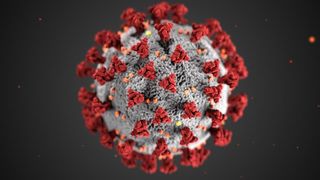
Coronavirus Disease 2019
COVID-19 and the Pleasures of Denial
"There's nothing to worry about. Really."
Posted May 14, 2020 Reviewed by Ekua Hagan

Catastrophe provokes varied responses. Particularly if the catastrophe is truly unexpected, like the arrival of interstellar aliens on the White House lawn.
One of the more common responses to disaster is the psychological defense of denial—the problem doesn’t exist. COVID-19 demonstrates that denial is more than protean; it can provide (for some) pleasant and profitable experiences.
Denial by the Rebel Hero
We begin with the remarkable, very Texan saga of Shelley Luther, Dallas hairstylist. (I am a proud former Texan, who spent four happy years in Houston.)
Ms. Luther’s beauty salon, “Salon a La Mode,” reopened on April 24th. Many have noted the particular challenge hair salons present for controlling COVID-19. In Germany, reopening requires owners to launder all gowns after each use; to sanitize all surfaces and instruments after every customer; that both stylist and client wear masks and engage in minimal oral communication, as the virus is spread by conversation.
Reopening Salon a La Mode was illegal. Governor Greg Abbott had placed an order than anyone violating his lockdown could face fines and 180 days in jail.
Ms. Luther was ticketed. In court, she refused to pay the fine, apologize, or wait the two days to reopen before the lockdown was lifted statewide. Instead, she told the judge that she was “feeding her kids” and would immediately return to her salon.
Sentenced to seven days in jail for contempt of court, support for her “stand” surged. Texas Attorney General Ken Paxton urged the judge to “reconsider and immediately release her.” Governor Abbott reversed himself, saying, “Throwing Texans in jail who had their businesses shut down through no fault of their own is nonsensical.” Despite his order of up to 180 days of jail time, he said, “I will not allow that to happen.”
Lieutenant Governor Dan Patrick promised not only to pay Ms. Luther’s fine but accept house arrest in her place. No longer an outlaw, she became an icon of the “freedom to infect” movement.
Sarah Palin came from Alaska to visit. Senator Ted Cruz got a trim.
After the Texas Supreme Court issued its ruling liberating Ms. Luther, she cried upon seeing her supporters.
She had defied the law and won. The governor, lieutenant governor had declared their direct legal orders null and void (in Texas lawlessness does possess historic cachet). Her salon received extraordinary positive publicity. Shelley Luther was a hero.
And a richer one.
Her GoFundMe legal defense fund, set up before she reopened her salon, has collected over $500,000. Her celebrityhood may also help with her alternate job as nightclub singer for the band “Crush” (she’s not a bad performer).
And for those who think her denial of concern about the virus was staged, there is the television interview of March 11th from KHOU, Houston. Ms. Luther and her boyfriend are about to board a cruise boat out of Galveston. Asked if they’re worried about the many cruise clients were getting sick with COVID-19, he replies that he’s checked it out with a medical buddy, and it’s no worse than the common cold.
Denial as a National Narrative
There’s nothing to worry about folks. Really.
President Trump’s many statements about the “unimportant” virus began at least by January 22nd when he said in Davos, “It’s one person coming in from China, and we have it under control. It’s going to be just fine.” Since then have been statements again of total control, that “it’ll disappear, like a miracle,” plus declarations that the pews would be full by Easter. More recently, Vice-president Pence, after exhorting meatpacking workers to return to work, pointed out that things would be fine by Memorial Day, May 25th. Before her appointment as Presidential Press Secretary, in February Kayleigh McAneny stated the coronavirus “is never coming to the United States.”
For those who doubt the veracity of such statements, Ms. McAneny explained to the White House press corps, “I will never tell you a lie.”
A variant embracing this national narrative of “no big deal” is “COVID-19 is no worse than flu.” The continuous parroting of this special form of denial provoked one ICU nurse I know to shout, “If I hear that COVID-19 is just another flu, I’m going to punch them in the nose, I swear!”
Denial as Bravery
President Jair Bolsonaro of Brazil talks of COVID-19 as “the sniffles.” He has also said it’s pointless to be scared of a “little flu.”
His popular health minister, an advocate of regional lockdowns, has resigned, yet President Bolsonaro says “the worse has passed” while deaths continue to climb. For “Brazilians should be studied; we don’t catch anything. You see people jumping in sewage, diving in it, and nothing happens to them.")
A popular American variant of this is seen in young people who tell me, “I’ve got nothing to worry about,” because COVID-19 is “just bad for old people.”
I quietly try to point out studies that though kids younger than 15 do experience less mortality, past that tender age COVID-19 pushes the death rate curves appreciably to the right for every group. Recent reports in The Economist say COVID-19 deaths take off an average of 11 years of life. Plus little kids are showing up with a new version of Kawasaki Disease where their arteries are immunologically attacked with awful results.
Bottom Line
Denial of disaster is normal. When you’ve lost your job and livelihood, can’t pay the rent, and fear entering a grocery store might kill you, lots of folks just want “the whole thing to go away.” Or as many patients tell me, “I just want my old life back.”
Sorry, it’s not coming back.
Yet the denials of the reality of COVID-19 have proven remarkable, creating its own propaganda industry.
Folks know we’re guinea pigs. Things have to open up. But how do you do it? What tradeoffs are worth it?
My argument is though I can’t stop becoming like most everyone a subject of an experiment, I do want to know the results. How many cases and deaths will “normal” haircutting cause? What are the risks of flying a plane from Tampa to LA? Without coordinated testing and tracing and tracking, you won’t know the answers. Unless, perhaps, it’s too late to stop a raging epidemic.
Fortunately, we now have national support for tracing and tracking. Unfortunately, it’s only for the White House itself, following cases among the president’s military valet and the vice president’s press secretary.
But who among the White House staff will tell the president of the recent NYU study showing a third or more of the Abbott ID Now tests he uses come back false negatives?
Of course, comedian Jackie Mason did say “Death is not the end.” He added, “There’s still the fight about the estate.”
So when the family falls out after another COVID-19 death and never unifies again, should we blame China?



